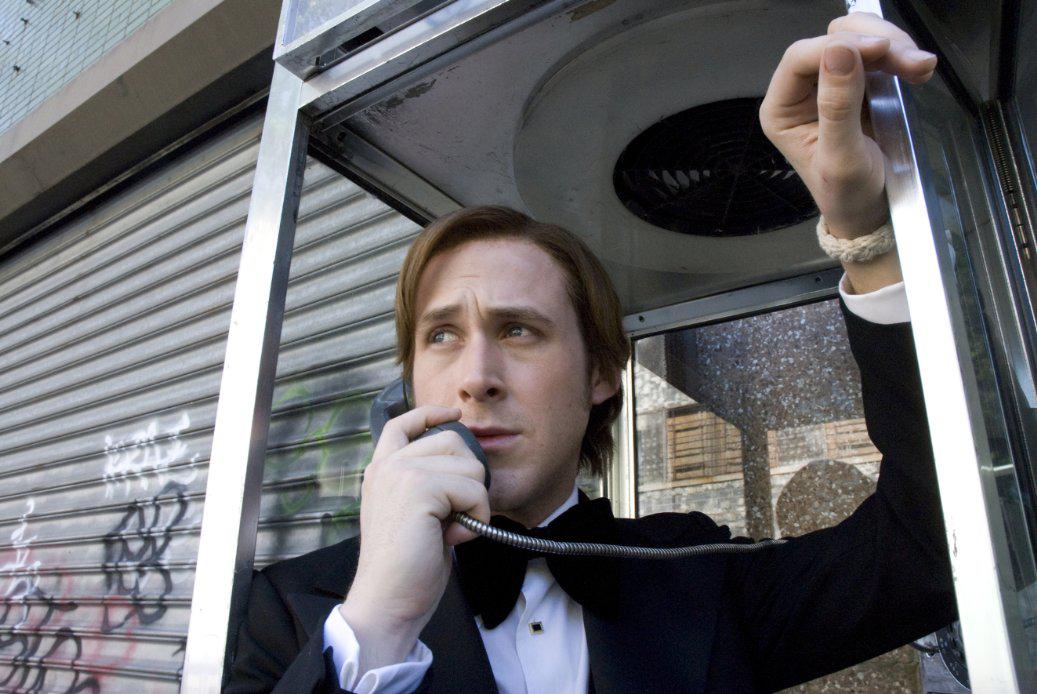Read all of Slate’s coverage of The Jinx.
Late Sunday night, having finished The Jinx, suffering from insomnia and still haunted by THE BURP, I decided I’d Netflix All Good Things—the lightly fictionalized 2010 biopic that was director Andrew Jarecki’s previous filmic foray into the life of Robert Durst. In considering the twinned challenges of capturing a fictional Durst in the pages of a script versus capturing the real-life Durst on tape, I noted some revealing contrasts. All Good Things fails as cinema, but it succeeds in laying bare the personal underpinnings of Jarecki’s 10-year obsession with Durst, and helps explain why Jarecki seemed to feel a connection to Durst even as it became hard to deny that the older man was a brutal killer.
All Good Things begins with its version of Durst (here named “David Marks” and played by Ryan Gosling) on the witness stand in his trial in Texas. But he’s not being questioned about the murder and dismemberment of which he’s been accused. He’s being asked to talk about his dead mom—thus framing the film as a look at Durst’s family and how it might have shaped Bob into the man that he became. This scene segues into the opening title sequence, in which Jarecki simulates home movies (made to look decades old) of Robert as a boy, frolicking on a large lawn with his family. Robert’s mother is shown laughing and skipping. Robert’s father is shown as a looming, unsmiling, distant presence.
The film goes on to posit that Robert’s fragile psyche got twisted by his domineering dad. Seymour Durst (here “Sanford Marks,” played by Frank Langella) steps in at key moments to belittle Robert. To tell him he’s a bad husband. To convince him that, no matter what she says, his wife Kathie (Kirsten Dunst as “Katie”) wants him to be a powerful businessman and not a happy hippie. Durst’s dad urges Bob to give up his bohemian dream of running a health food store and instead button up and join the family’s lucrative Manhattan real estate business. He squashes Robert’s soul, and a demon emerges from the wreckage.
There is truth to this sketch of the Durst father-son dynamic. But a 2010 New York Times story about the facts behind the film had this to report about Durst’s real-life father:
Real estate executives describe the elder Mr. Durst, who died in 1995, as a tiny, polite if eccentric man, a skilled negotiator but one who rarely raised his voice as Mr. Langella’s menacing character does.
“Seymour had no resemblance to the hulking Langella,” said Nick Chavin, a real estate advertising executive who worked for him. “He was a sweetheart.”
Robert Durst said that while he found Mr. Langella to be “not bad” in the role, his father was never as “sharp and aggressive when it comes to me.”
You know who really did have an intimidating dad—one who steered his son away from creative pursuits, and tried to mold the boy in his own image? Andrew Jarecki. Jarecki’s father Henry had been a psychiatry professor at Yale before switching careers and becoming a wealthy commodities trader and financier. Here are newspaper quotes from Andrew, some dating to long before the filming of All Good Things:
“I was getting ready to go to graduate school [in 1985] for directing when my father, a very Teutonic, work-oriented, taskmaster type said, `That artistic stuff is great but you need to learn what a treasury bill is.”
“He wanted to capture me into business.”
[W]ould-be auteur Andrew Jarecki says he was urged by his “German-overbearing, capitalist” father to put business fundamentals before pleasure.
Jarecki went to work for his father for a time, joining the family firm and, according to the Australian Financial Review, “dribbling numbers into a giant book.” Jarecki’s first real success came as the one of the co-founders of Moviefone, a business he started in part with a $15 million loan from the financial services company where his father was chairman. It was only after Moviefone got sold and Jarecki netted a big payday that he pursued filmmaking, his original love.
It’s the nature of fiction that the auteur can’t help but smudge his fingerprints all over the story. And so All Good Things focuses on what I now see as distinctly Jareckian psychological concerns: overbearing papas, and the struggle to find creative freedom and individuality under the thumb of a pragmatically-minded patriarch. It’s easy to imagine this being the emotional through-line that drew Jarecki to Durst in the first place, and let him sympathetize with Durst over the years. But All Good Things is, in truth, more Andrew than Bob.
Gosling’s performance, for instance, doesn’t emulate Durst’s physical tics—the blinking and gurning, the headscratching and facerubbing. (Here Durst himself would add: “And the burping.”) He cuts a far less oddball figure than the Durst we see in The Jinx. At the time All Good Things was released, Durst told the New York Times that Gosling was “not as good as the real thing,” and he was correct. Gosling fails to capture Durst’s quiet electricity and the eerie diffidence that masks his underlying will.
Gosling’s Durst is, one must say, too recognizably human. Too relatable. The Durst of All Good Things is a pretty regular guy, aside from the murdering. He acts more like how Andrew Jarecki might imagine himself acting if he were pushed a million steps too far by his uneasy relationship with his dad.
Roger Ebert wrote in his 2010 review of All Good Things, “I don’t understand David Marks after seeing this film, and I don’t know if Andrew Jarecki does.” That’s because Jarecki tried to make sense out of something that makes no sense. In The Jinx, we see the actual Robert Durst, a guy who only remotely resembles a human being. He seems to have a few crossed wires in his head. There is no simple answer, no tidy biographical explanation. With this story, that’s the reality.
